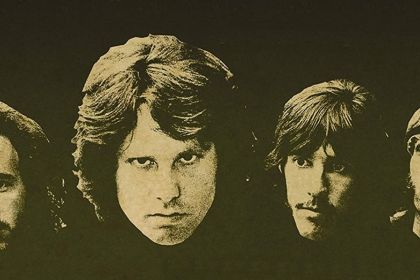Music Theory
The Doors songs that use just three primary chords

The Doors' Live Seattle 1970 LP cover
The prevalence of the three-chord song structure in Western popular music has, at this point, become emblematic. More often than not, you will find pop releases with harmonic accompaniment based on simple combinations of just three chords.
Essentially, these tracks show progressions involving three primary major chords of the Ionian mode, the structure of which is analyzed in detail in our article 6 songs to unpack Ionian mode and the major scale.
The term 'primary chord' is usually applied to the chords of the Ionian or Aeolian modes that are rooted in the first, fourth, and fifth scale degrees. Primary chords are sometimes named after the harmonic functions they represent, namely tonic, subdominant, and dominant.
Our harmonic analysis of the songs recorded by outstanding rock bands revealed dozens of three-chord tracks, most of which were composed with the three major chords of the Ionian mode. Such songs are available in the repertoires of The Doors (6 tracks), The Beatles (18 tracks), Pink Floyd (6 tracks), and Led Zeppelin (7 tracks).
The three-chord songwriting technique is quite typical of certain genres, such as blues or rock and roll, where this approach dominates. Moreover, there is a so-called 'blues formula'—the template chord progression that can be found in almost all blues songs.
The Doors' You Make Me Real follows exactly this blues formula chord progression. In the harmonic analysis of the song chord chains, the scale degrees (denoted with Roman numerals) show the following progression in the key of С major: C7–F7–C7–G–F7–C7 or I7–IV7–I7–V–IV7–I7.
Note, that the chord chain exposes a classical musical turnaround called the plagal cadence that appears twice in the progression IV7–I7.
Listen to You Make Me Real (2020 Remaster) by The Doors:
A similar blues progression occurs in the first and third verses of The Doors' Cars Hiss by My Window written in E Ionian:
- A7–E–A7–E–B7–A7–E or IV7–I–IV7–I–V7–IV7–I for verses 1 and 3;
- E–A7–E–A7–E or I–IV7–I–IV7–I for verse 2.
In the second verse, the harmony is simplified and reduced to a looping plagal cadence.
Listen to Cars Hiss By My Window (2021 Remaster) by The Doors:
A looped plagal cadence also appears in the verses of The Doors' Soul Kitchen composed in A Ionian: A–D or I–IV. Here, triads rooted in the first and fourth scale degrees are sometimes replaced by seventh chords.
The choruses are accompanied by another looped two-chord alternation: E–D or V–IV. Chorus harmony juxtaposes dominant and subdominant chords, thereby increasing tension, which is then resolved by the tonic chord at the beginning of the upcoming verse.
Listen to Soul Kitchen (New Stereo Mix) by The Doors:
The authentic cadence—another essential turnaround in classical music—underlies The Doors' Moonlight Drive harmony, with the first verse accompanied by a looping two-chord progression in the key of G major: G7–D7–G7 or I7–V7–I7.
The second verse intrigues with a sudden modulation into the A Ionian, and the same progression based on the V7–I7 authentic cadence is repeated in the newly established key: A7–E7–A7 or I7–V7–I7.
From the third verse, the song harmony turns to the A7–D plagal-cadence riff with the exception of the line "easy to love you as I watch you glide"—this one performed with E7 dominant seventh chord instead.
Listen to Moonlight Drive (2017 Remaster) by The Doors:
The three-chord blues formula, with some variations, also appears in The Doors' covers of famous blues songs including Back Door Man written in A Ionian with the following progression: A7–D7–A7–E7–D7–A7 or I7–IV7–I7–V7–IV7–I7.
The intro shares the A7–D7–A7 looping typical two-chord rock riff that also extends into the beginning of the verses accompanying the lines: "Oh yeah oh man, I'm a back door man".
Listen to Back Door Man (2017 Remaster) by The Doors:
The Doors' version of the iconic Crawling King Snake is arranged in a very similar way, but in the key of E Major. E–A7–E–B7–A–E or I–IV7–I–V7–IV–I.
Listen to Crawling King Snake by The Doors:
Explore how The Doors uses other musical modes:
- The Doors songs with Aeolian and harmonic minor modes
- Mixolydian mode in The Doors songs
- Dorian mode in The Doors songs
- Peace Frog: the only Doors song featuring Lydian mode
Discover more songs composed in Ionian major mode and check out their harmonic analysis in the following articles:
- 6 songs to unpack Ionian mode and the major scale
- 9 Beatles songs that combine harmonic major with Ionian mode
- Longfellow Serenade and the fireside poet that kindled Neil Diamond's song
- Wildwood Weed: the cheeky ganja farmers song that got banned
- Sugaree: Jerry Garcia's song referencing his lyricist's criminal past
- D'yer Mak'er: meaning of Led Zeppelin's most controversial song
- Seven Seas of Rhye: song of imaginary land brought to life by Ionian and Mixolydian modes
- Coal Miner's Daughter was forced to remove a third of the lyrics from her autobiographical song
- I Wanna Be Sedated: pure classical harmony cementing the Ramones' hit in punk rock history
- Hasta Mañana: the origins of the best ABBA ballad



